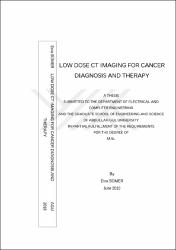Low dose CT imaging for cancer diagnosis and therapy
Abstract
Cancer is a common disease among human population and second leading cause of death. It is well known that diagnosing cancer at early stages is very critical for increasing success of therapy. There have been different imaging modalities used in diagnosing and staging of cancer. One of them is computed tomography (CT) that provides two-dimensional (2D) slices of three-dimensional (3D) object using the series of projections taken around the object. The main limitations of CT are radiation dose and low sensitivity to soft tissue. Firstly, fewer projections can be used to lower dose in CT which causes the reconstruction problem heavily underdetermined. Former studies proposed iterative reconstruction techniques to overcome this problem. The significant weakness of these methods is their computational expensiveness. In the present thesis, this problem is addressed by developing a computationally efficient filtered back projection (FBP) based method using total variation (TV) minimization. 2D modified Shepp-Logan phantom is used for performance evaluations. The superiority of the proposed method is shown both qualitatively and quantitatively. The second aim of the thesis is to enhance contrast capability of CT imaging by using novel magnetic nanoparticles (MNPs) as contrast agents which were fabricated at Mechanical Engineering Department of Istanbul Technical University. The pixel density enhancements of CT images induced by five different core types of MNPs in the agarose gel are analyzed. The results confirm the effectiveness of the MNPs as contrast media for CT imaging.


















